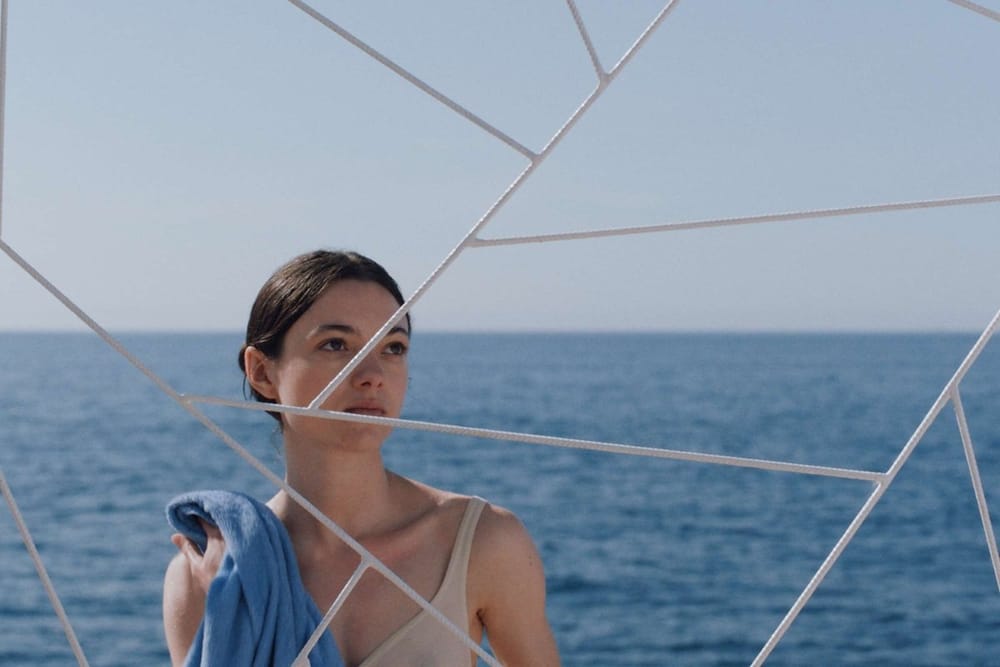It reminded me of a summer I once spent by the French seaside, lying on warm sand with a book in hand, the waves whispering nearby, the sun soft and golden overhead. There’s a similar stillness here, a mood that lingers like salt on the skin. Just beautiful.
What Bonjour Tristesse evokes is not simply summer, but the kind of summer that feels like memory even as it's happening—sun-drenched and dreamlike, soft-edged with longing. It’s the echo of laughter at dusk, the hush of secrets shared on a veranda, the languor of afternoons that stretch forever until they don’t. And through it all, the ache of growing up too soon, of watching innocence curdle in the heat, of learning that beauty doesn’t shield us from pain—it invites it.
Durga Chew-Bose’s adaptation of Françoise Sagan’s novel is less a faithful retelling than a reverie, a moody drift through adolescent unrest. The camera never rushes; it floats. Like a page caught on the wind, the film tumbles gently between scenes—sunlight dappling through gauzy curtains, the sea always just beyond, blue and bottomless. Everything here feels tactile: the crisp linen, the lemony perfume of sunscreen, the brine in the air. It captures the texture of summer, not just the look.
Cécile (McInerny’s Cécile), our 18-year-old guide through this sunlit melancholy, is full of contradictions. She’s idle, but alert; careless, yet quietly observant. Her world is one of indulgence—her father’s villa is a paradise of comfort, where lovers come and go like waves. Elsa (Nailia Harzoune), the latest in a line of his fleeting romances, is young, vibrant, and destined to be replaced. But then Anne (Chloë Sevigny) arrives.
Anne is different. A family friend from another life, she carries herself with elegance and quiet authority—a poised, precise woman whose every gesture feels deliberate. She’s not here to flirt or amuse. She brings structure, a kind of moral gravity, and when she and Raymond (Claes Bang) announce their sudden engagement, Cécile’s illusion of eternal summer begins to shatter. The woman who once braided her hair and smiled knowingly now threatens to reorder her world.
What begins as a summer of sunbathing and flirtations becomes something far more dangerous: an awakening. Cécile doesn’t lash out in tantrum; instead, she schemes in silence, enlisting Elsa in a quiet campaign to unravel Anne’s hold on her father. It’s a betrayal wrapped in charm, a cruelty masked by youth.
And yet, the film resists melodrama. It is too refined, too composed. Even in its most emotionally fraught moments, there’s restraint. Grief comes not in loud sobs, but in the silence after a door closes. Regret shows up in a glance held a second too long. Chew-Bose seems more interested in the quiet violences we inflict on one another—through omission, through distance—than in overt dramatics. It's this subtlety that stays with you, like the sting of sunburn you didn’t notice until nightfall.
Visually, the film is immaculate. Each frame feels composed with painterly care. Blues dominate—the sea, the sky, even Cécile’s phone case—creating a palette that cools even as it seduces. The interiors of the villa are a study in lived-in luxury: cracked tiles, worn linen, vases of wildflowers wilting just slightly. It’s not about opulence—it’s about mood. The Riviera, as seen here, is not a postcard but a poem.
The performances mirror the film’s tone: quiet, internal, glinting with undercurrents. Lily McInerny’s Cécile is not a teenage firebrand, but something more complex—sullen, clever, aching. Chloë Sevigny, as Anne, gives a performance of such crystalline control that even her silences carry weight. And Claes Bang, as Raymond, exudes the kind of charm that curdles on second glance.
But what I found most moving was the film’s final gesture—a deviation from the novel that doesn’t feel like invention, but culmination. A reckoning. It reframes the preceding hours not as idle drama, but as the beginning of emotional consequence. It’s the moment the golden light fades and the shadows stretch longer. When summer begins to slip through your fingers.
Bonjour Tristesse may not be for every viewer. It is deliberately languid, unconcerned with traditional arcs. It prefers suggestion to exposition, feeling to action. But for those who’ve ever spent a summer teetering between adolescence and adulthood, between cruelty and tenderness, between freedom and fear—it resonates like the hum of cicadas at twilight.
It reminded me, too, of an old love. Not a person, but a feeling—of being young and beautiful and cruel, and not knowing it yet. Of thinking the world would always be as it was in that moment, and then waking to find it changed.
There’s a sadness here that isn’t loud, but lingers. It tastes of salt and sun and spoiled sweetness. It’s the sadness of growing up. Of realizing that loving someone doesn’t mean keeping them. Of understanding that paradise, once disturbed, cannot be restored. Only remembered.
And maybe that’s the point. Not to preserve the summer, but to mourn it. To look back, years later, and say: There I was, and I didn’t know what I had. Bonjour, tristesse.
Director: Durga Chew-Bose
Cast: Chloë Sevigny, Lily McInerny, Claes Bang
Writer: Durga Chew-Bose, (based on Bonjour tristesse by Françoise Sagan)
Producers: Durga Chew-Bose, Joe Iacono, Benito Mueller, Wolfgang Mueller, Katie Bird Nolan, Christina Piovesan, Noah Segal, Lindsay Tapscott, Julie Viez
Composer: Lesley Barber
Cinematographer: Maximilian Pittner
Editor: Amélie Labrèche
Screening or Streaming Availability:

